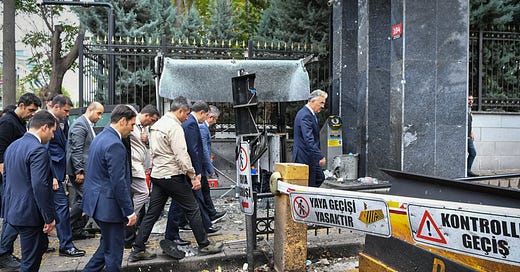Before we start, two maps you didn’t know you needed: top famous dishes across Turkey and top words for “cannibal” across Europe. Everything’s gonna be all bite.
In this week’s issue:
The Ankara attack and response
The parliamentary agenda and TİP march
A top court upholds five Gezi sentences
EU-Turkey ties are one of a bind
Economy: Rising costs (and hopes)
Daily horror scopes and culture wars
And do read Diego Cupolo’s latest report on the implications of the Zangezur Corridor.
Sunday at about 9:30 AM, a suicide bomber targeted the entrance of the Interior Ministry building in Ankara. The attack left two assailants dead and two police officers wounded. A day prior, the attackers killed a veterinarian in Kayseri and used his car for the bombing.
The PKK claimed responsibility shortly after the attack. In a statement on ANF, a news agency with links to the PKK, the militant group said its aim was to warn the government, and that it specifically chose the opening day of parliament.
“By striking at the heart of Turkey's capital, the PKK is likely attempting to demonstrate that it may be down but not out,” Berkay Mandıracı, senior Turkey analyst for International Crisis Group, told Turkey recap.
“But these types of sensational attacks, beyond deepening the cycle of violence, are unlikely to lead anywhere,” he added.
The parliament’s ceremony proceeded as planned with Pres. Erdoğan in attendance. During his opening speech, Erdoğan said this was “the last bit of terrorism” in the country. He also stressed Turkey was still determined to protect its southern borders with a 30-kilometer-deep “security strip” into Syria.
That same night, Ankara retaliated with airstrikes on PKK targets in northern Iraq, where nearby villagers live in fear. On Monday morning, 20 people were detained in İstanbul and Kırklareli, including several HDP members. Further pressure on pro-Kurdish parties can be expected ahead of municipal elections.
More strikes were carried out in Iraq Tuesday and Wednesday, and will likely continue, as FM Hakan Fidan shifted attention to Syria, claiming the Ankara attackers came from Syria (which the SDF denied) and that also the mastermind behind the İstikal attack in Nov. 2022 was killed in Syria.
“From now on, all infrastructure, superstructure and energy facilities of the PKK and YPG in Iraq and Syria, are the legitimate targets for our security forces,” Fidan said Wednesday. He added that third parties should be warned in an apparent message to the US, whose troops are collaborating with the Kurdish-led SDF.
“The four-decades-old PKK conflict remains locked in a cycle of escalation with a host of regional actors drawn into the conflict. This renders it more complicated and intractable,” analyst Mandıracı commented about the way forward.
He continued, “I don't see any opening on the horizon. Ankara will likely remain focused on militarily squeezing the PKK, and the PKK and its affiliates will try to push back against that as much as their capabilities allow in order to consolidate whatever influence and gains [they have] left in northern Iraq and northern Syria.”
– Ingrid Woudwijk
Keep reading with a 7-day free trial
Subscribe to Turkey recap to keep reading this post and get 7 days of free access to the full post archives.




